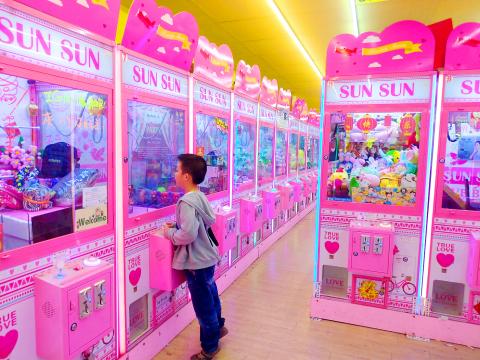People should be aware of the symptoms of addiction if they find themselves spending a lot of money on claw machines, Tainan Municipal An-Nan Hospital psychiatrist Chang Chun-hung (張俊鴻) warned.
Most people can enjoy claw machines as an occasional activity, but those with tendencies toward addiction might find that they are unable to pull themselves away, even if they win prizes, Chang said.
Chang, who is also director of the hospital’s psychiatry department, cited the case of a 35-year-old man surnamed Lin (林), who he treated for severe addiction to claw machines.

Photo: Tsai Ya-hua, Taipei Times
Lin, who worked as an elevator repairman, spent all his money on the machines and even took out a loan to continue using them, Chang said.
Lin turned to theft to fuel his habit — for which he was arrested and charged, costing him his job, Chang said.
In a separate case, a 40-year-old construction worker surnamed Chang (張) spent all of his salary of about NT$20,000 on claw machines, Chang Chun-hung said.
However, after his money was gone and he still did not have the Bluetooth speaker he was after, the construction worker used a strong magnet to maneuver the gadget out of the machine, Chang Chun-hung said, adding that the owner of the arcade reported the incident to the police.
An explanation for the popularity of claw machines could be the psychological effects of the “cute” figurines they often contain, the psychiatrist said.
People are also drawn to bright and colorful objects, he said, citing research involving newborns.
The upbeat music that claw machine parlors usually play also motivates people to spend, he said.
Research has uncovered new triggers for pleasure centers in the brain, and there is speculation that claw machines trigger these, releasing dopamine, he said.
As with other addictions, those who become hooked on claw machines might find that they are drawn to more expensive or challenging machines, he said.
Furthermore, people might experience withdrawal symptoms or a sense of helplessness over their perceived irrationality, Chang Chun-hung said.
It is common for people with an addiction to have other conditions, he said. More than half of young people with addictions also show signs of depression or attention deficit hyperactivity disorder.
Both conditions must be addressed at the same time for treatment to be effective, he said, adding that it did not necessarily require medication.
Those who find themselves unable to stop using claw machines — or stop other behaviors — should consult a psychiatrist, such as those at his hospital, he said.

Johanne Liou (劉喬安), a Taiwanese woman who shot to unwanted fame during the Sunflower movement protests in 2014, was arrested in Boston last month amid US President Donald Trump’s crackdown on illegal immigrants, the Criminal Investigation Bureau (CIB) said yesterday. The arrest of Liou was first made public on the official Web site of US Immigration and Customs Enforcement (ICE) on Tuesday. ICE said Liou was apprehended for overstaying her visa. The Boston Field Office’s Enforcement and Removal Operations (ERO) had arrested Liou, a “fugitive, criminal alien wanted for embezzlement, fraud and drug crimes in Taiwan,” ICE said. Liou was taken into custody

The US-Japan joint statement released on Friday not mentioning the “one China” policy might be a sign that US President Donald Trump intends to decouple US-China relations from Taiwan, a Taiwanese academic said. Following Trump’s meeting with Japanese Prime Minister Shigeru Ishiba on Friday, the US and Japan issued a joint statement where they reaffirmed the importance of peace and stability in the Taiwan Strait and support for Taiwan’s meaningful participation in international organizations. Trump has not personally brought up the “one China” policy in more than a year, National Taiwan University Department of Political Science Associate Professor Chen Shih-min (陳世民)

‘NEVER!’ Taiwan FactCheck Center said it had only received donations from the Open Society Foundations, which supports nonprofits that promote democratic values Taiwan FactCheck Center (TFC) has never received any donation from the US Agency for International Development (USAID), a cofounder of the organization wrote on his Facebook page on Sunday. The Taipei-based organization was established in 2018 by Taiwan Media Watch Foundation and the Association of Quality Journalism to monitor and verify news and information accuracy. It was officially registered as a foundation in 2021. National Chung Cheng University communications professor Lo Shih-hung (羅世宏), a cofounder and chairman of TFC, was responding to online rumors that the TFC receives funding from the US government’s humanitarian assistance agency via the Open Society Foundations (OSF),

ANNUAL LIGHT SHOW: The lanterns are exhibited near Taoyuan’s high-speed rail station and around the Taoyuan Sports Park Station of the airport MRT line More than 400 lanterns are to be on display at the annual Taiwan Lantern Festival, which officially starts in Taoyuan today. The city is hosting the festival for the second time — the first time was in 2016. The Tourism Administration held a rehearsal of the festival last night. Chunghwa Telecom donated the main lantern of the festival to the Taoyuan City Government. The lanterns are exhibited in two main areas: near the high-speed rail (HSR) station in Taoyuan, which is at the A18 station of the Taoyuan Airport MRT, and around the Taoyuan Sports Park Station of the MRT